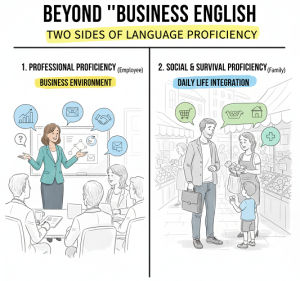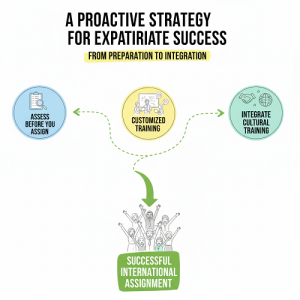Imagine this: your company is investing over €250,000 to send a top director, Anna, on a three-year assignment to expand your operations in Warsaw. She’s a star performer, and the office in Poland operates in English, so you’re confident in her success. You’ve handled the visa, the shipping, and the housing. Everything is set.
Six months later, you get a call. The assignment is on the verge of collapse. It’s not Anna’s performance; her work is exemplary. The problem is her family. Her partner is overwhelmed, unable to handle basic errands like grocery shopping or speaking with a pharmacist. Her children are struggling to make friends, feeling isolated and withdrawn. The daily stress has reached a breaking point.
This scenario is all too common, and it highlights a critical oversight in many global mobility programs: we plan for the employee, but we often forget about the family. The real key to a successful international assignment isn’t just professional proficiency; it’s ensuring the entire family has the language skills they need to build a new life.
The cost of a failed assignment
A failed international assignment is more than just a logistical headache; it’s a significant financial blow. Industry estimates place the cost of a failed assignment at two to three times the employee’s annual salary, easily running into hundreds of thousands of euros. This includes expenses for relocation, training, and the immense loss of productivity and business opportunity.
Crucially, studies consistently show that the number one reason for these failures isn’t the employee’s inability to do their job. It’s the family’s failure to adapt to the new environment. When a family is unhappy and isolated, even the most resilient employee will struggle to succeed.
Beyond “business English”: the two sides of language proficiency
To ensure a successful transition, companies need to address two distinct types of language needs:
- Professional proficiency (for the employee): this is the most obvious requirement. The employee must be able to communicate effectively in the business environment. This goes beyond basic fluency. Can they:
- Negotiate complex contracts?
- Lead a team with cultural nuance?
- Understand industry-specific jargon?
A thorough, professional language audit before the assignment is crucial to confirm these skills and identify any potential gaps.
- Social & survival proficiency (for the family): this is the hidden hurdle and the most critical factor for family integration. Life happens outside the nine-to-five. The ability for a partner or child to perform everyday tasks is what transforms a foreign country into a home. This includes:
- Navigating public transport.
- Speaking with doctors, teachers, and landlords.
- Building a social network and making local friends.
Without these foundational language skills, isolation and frustration are almost guaranteed. A family that can’t integrate is a family that will want to go home.
A proactive strategy for expatriate success
Treating language support as an afterthought is a recipe for disaster. Instead, a proactive approach can be the single greatest factor in ensuring the success of your investment.
- Assess before you assign: the most effective strategy starts early. Conduct language assessments for both the employee and their partner as soon as an international assignment is being considered. This provides a clear, objective understanding of their current abilities and allows you to build a tailored support plan.
- Provide customized training: a one-size-fits-all online course won’t cut it. The employee might need advanced business negotiation skills, while their family needs practical, conversational language focused on daily life.
- Integrate cultural training: language is the key to unlocking culture. The best support programs combine language lessons with cross-cultural training to help the family understand local customs, etiquette, and social norms, accelerating their sense of belonging.
The ROI of language support: from surviving to thriving
Viewing language assessment and training as a cost is a mistake. It is an insurance policy on your significant investment. The returns are clear:
- Dramatically higher assignment success rates.
- Faster time to productivity for the employee.
- Improved mental health and well-being for the entire family.
- A stronger employer brand that shows you truly care for your people.
By investing in language support for the whole family, you’re not just setting up an employee for a new job. You’re setting up a family for a new life, ensuring your star performer can remain focused, productive, and committed to their role for the full duration of the assignment.
Planning an international assignment? Don’t leave its success to chance. Use comprehensive language assessments for employees and their families to ensure a smooth and successful transition. Secure your investment and set your people up for success. Contact us today to build your expatriate support strategy.







